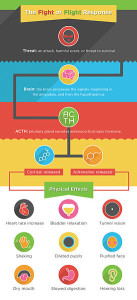
Arguments, frustrations, conflicts, disappointments – these are all part of what we call life. And we rarely enter these negative interactions alone; stress is often a family affair. The old adage is very true, “It takes two to tango;” but, the stress dance can be multiplied when you engage 3, 4, 10, or more!
And, while we’ve all heard the unhelpful expression, “Sticks and stones may break my bones, but words will never hurt me,” research shows that not only can words indeed hurt you, they can kill you.
When faced with extreme stress, our bodies go into “emergency mode,” and we react in a prescribed pattern. This is part of what is known as the fight or flight mechanism. It is a physiological survival response designed to help us cope in times of danger. Whenever there is a perceived threat, your body shifts energy to more martial systems, maximizing your opportunity to get safely through the situation.
 First, the adrenal glands flood your system with adrenaline and cortisol. These hormones make the heart beat faster, raise blood pressure, slow down the digestive process, increase blood flow to the muscles, and boost glucose levels in the bloodstream. Your energy level soars, muscles contract, your jaw becomes rigid, and your respiratory system increases. Often, your senses of vision, hearing, and smell become sharp and focused.
First, the adrenal glands flood your system with adrenaline and cortisol. These hormones make the heart beat faster, raise blood pressure, slow down the digestive process, increase blood flow to the muscles, and boost glucose levels in the bloodstream. Your energy level soars, muscles contract, your jaw becomes rigid, and your respiratory system increases. Often, your senses of vision, hearing, and smell become sharp and focused.
In contrast, your sense of pain may be numbed. This is all part of the body’s programmed response to deal with the perceived and real threats of life, and get you safely through a dangerous time.
But, what occurs when such threats, especially those stemming from arguments and frustrations, occur on a daily basis? And what physiological dangers might come about if the source of such stress comes from within one’s own family?
Stress and Negative Emotions
To answer these questions, a group of Danish researchers from the University of Copenhagen recently conducted an extensive study on stressful social relations and mortality. The results were published in the Journal of Epidemiology and Community Health.
The study revealed that frequent anxiety and demands coming from one’s own spouse or children were associated with a 50 to 100% increase in death from all causes. But, when such worries turned into serious conflict, the numbers skyrocketed.
 Frequent conflicts in the home increased one’s mortality risk 2 to 3 times! Interestingly, when such close social conflicts were coupled with unemployment or underemployment, the risk of death from all causes increased even more!
Frequent conflicts in the home increased one’s mortality risk 2 to 3 times! Interestingly, when such close social conflicts were coupled with unemployment or underemployment, the risk of death from all causes increased even more!
Personally, I have to wonder if poor eating habits, fast-fix pharmaceuticals, and a general lack of exercise and healthy living contribute to these numbers. Still, there is no doubt that familial stress contributes to poor health.
An angry man stirs up strife, and a furious man abounds in transgression. (Proverbs 29:22)
Stress has been linked to a number of physical challenges, including depression, anxiety, heart attacks, stroke, hypertension, certain cancers, multiple sclerosis, lower immune system, adrenal fatigue, thyroid problems, and more. It is especially troubling to consider that the source of the most damaging stress might be found in one’s own household.
Simply stated, a life of stress and debt can be hazardous to your health!
Better is a dinner of herbs where love is, than a fatted calf with hatred. ~ Proverbs 15:17
But, there is help! Dr. Rikke Lund, with the University of Copenhagen, said this when asked about the survey results, “Intervening in conflicts, particularly for those out of work, may help to curb premature deaths associated with social relationship stressors.”
Ways to help reduce stress in the family:
- “You will keep him in perfect peace, whose mind is stayed on You, because he trusts in You.” (Isaiah 26:3) A living faith in Jesus Christ is the only way to find and maintain true peace.
- Join a healthy church where you’ll find fellowship, accountability, help during trouble, and spiritual growth. As a Christian, the weekly corporate worship of God will strengthen you, and help to reduce tension and stress within yourself and in your family.
- Pursue positive family interactions on a daily basis. This could begin by simply sitting down and eating dinner together. Many families are so dysfunctional that a common family meal is…well, very uncommon.
- In addition to family prayer/worship, every member of a family should have a private time of prayer and devotion. Another recent study by the Norwegian University of Science and Technology showed that daily prayer significantly reduced stress.
- Play peaceful music in your home on a regular basis. Simple instrumental music can help reduce tension in the home. In contrast, certain music can increase stress levels in a home.
Stress and Essential Oils
 And, of course, we have found essential oils to be very helpful in creating a relaxing environment. We diffuse Frankincense and citrus oils on a regular basis. You can also diffuse various Young Living’s blends such as Joy, Stress Away, Harmony, or Transformation.
And, of course, we have found essential oils to be very helpful in creating a relaxing environment. We diffuse Frankincense and citrus oils on a regular basis. You can also diffuse various Young Living’s blends such as Joy, Stress Away, Harmony, or Transformation.
We use Peace and Calming on our children before they go to bed to help them settle down and get a good night sleep. Also, Frankincense, Lavender, and Valor make great alternatives to cologne or perfume and actually help to bring a sense of calming – and many of those are in the Starter Kit!
And don’t forget Vetiver, which has been known to help overactive children relax. I use it myself when I’m feeling moody or overly emotional.
Be proactive! We strive to utilize Young Living’s amazing supplements – supplements that are infused with essential oils to help support a healthy immune system. Ningxia Red is also a great choice, and it’s part of our regular morning routine.
Financially De-Stress
 And, recognizing that finances can be a significant source of familial stress, you might want to check out what we call our “accidental paycheck” video. You see, Young Living not only offers products that promote good health, but it also offers a very generous referral program that can promote healthy family finances…even complete financial freedom! See Business Opportunity
And, recognizing that finances can be a significant source of familial stress, you might want to check out what we call our “accidental paycheck” video. You see, Young Living not only offers products that promote good health, but it also offers a very generous referral program that can promote healthy family finances…even complete financial freedom! See Business Opportunity
Was Jesus Ever Stressed?
No one can avoid stress altogether; it is simply part of the human experience. Even Jesus, who was fully man and fully God, experienced the pain and stress of living in this fallen world. But take note:
Then Mary took a pound of very costly oil of Spikenard, anointed the feet of Jesus, and wiped His feet with her hair. And the house was filled with the fragrance of the oil. (John 12:3)
The first time I smelled Spikenard, I wasn’t sure what I thought. I detected the slight hint of Valerian, which I’m not overly fond of. I wondered if Jesus really enjoyed the aroma when Mary poured it on his feet. However, after learning more about the amazing benefits of essential oils, I had to wonder if what Jesus found pleasing had more to do with the scent of Mary’s motives, than it did the scent of the oil (Mark 14:9).
 A relative of the Valerian family, Spikenard has the most powerful calming scent in aromatherapy. The properties of this precious oil have long been known.
A relative of the Valerian family, Spikenard has the most powerful calming scent in aromatherapy. The properties of this precious oil have long been known.
“Assuredly, I say to you, wherever this gospel is preached in the whole world, what this woman has done will also be told as a memorial to her.” Mark 14:9
I used to wonder why Mary chose Spikenard to anoint our Lord. Now, after learning more about this amazing oil, I suspect Mary’s feminine, nurturing spirit was attempting to lovingly bless and sooth our Lord before the trauma to come.
“Now thanks be to God who always leads us in triumph in Christ, and through us diffuses the fragrance of His knowledge in every place.” (2 Corinthians 2:14)
As we learn to walk “in the spirit,” we are more likely to avoid walking in the ways of stress; which, for us, is often simply a symptom of walking “in the flesh.” And, as I’ve shared here, there are physical ways (including the use of God’s gift of essential oils) that will help alleviate the ways we are daily tempted to give in to stressful living.
For those who live according to the flesh set their minds on the things of the flesh, but those who live according to the Spirit, the things of the Spirit. For to be carnally minded is death, but to be spiritually minded is life and peace. (Romans 8:5)





